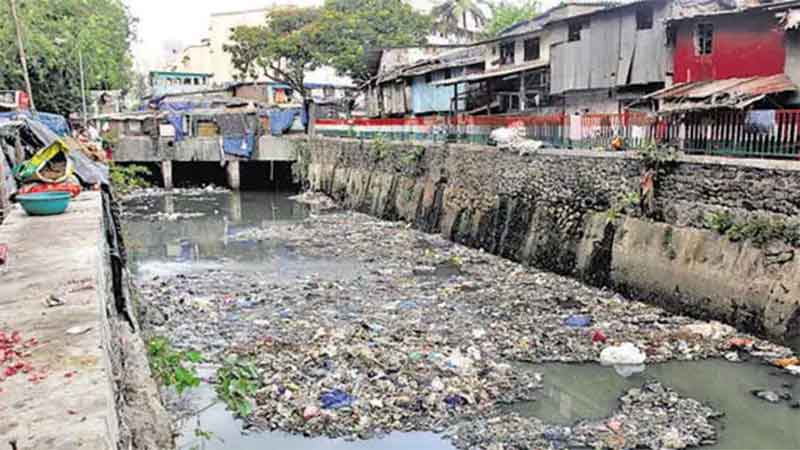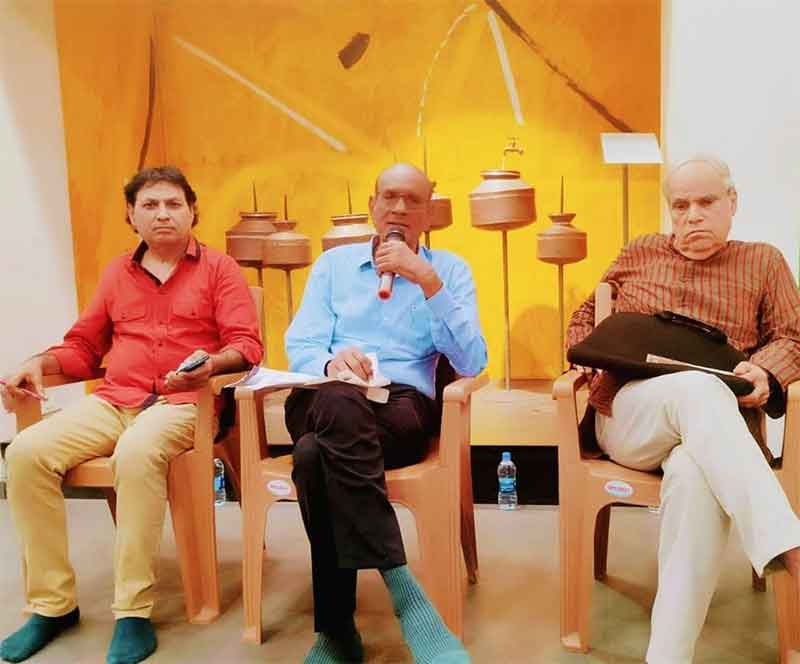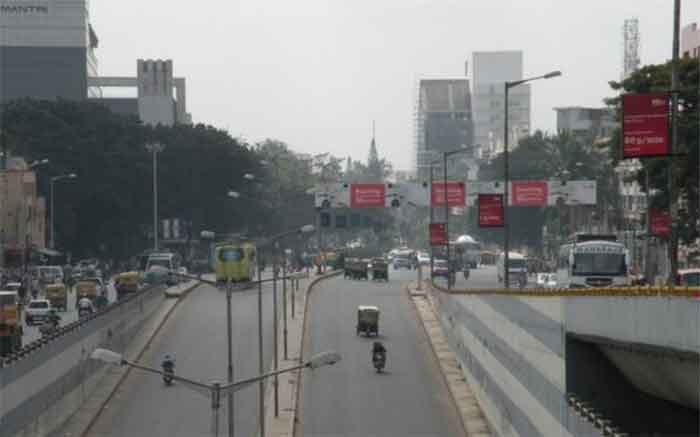
Had a lovely sensory experience outside Trident five star hotel at Bandra Kurla complex last evening. Visual treat as well .The front portion of the hotel has white Champak flower trees on both sides of the entrance.
Similar champak trees in the garden on the other side of the road in front of the hotel means the whole area has such fragrance.
Quite a contrast to the Ambani cultural centre on the other side of the road. No flowering trees welcome you. In fact inside there are large artificial flowers which is such a pity because a group that maintains a private zoo with elephants in Jamnagar can easily create a nice ambience with flowers and plants, it costs so little. What you need is an aesthetic outlook. In fact, machine gets precedence at the centre with a display of a Mercedes car under an agreement reached with the automobile company.
The Godrej complex at the other end of the road has a lovely little garden with champak flowers and sitting space, free , accessible to the public, it is so rare and such a pleasant surprise
As the Ambani centre completes a year this month end, one notices that the art gallery and a huge exhibition space in other areas is closed , reportedly for some renovation.
Instead, there has opened in the adjoining premises now a very luxurious Jio plaza mall with top international brands, glittering and very expensive. So there were hardly any customers visible in any of the outlets thought it was a Saturday evening. There was a tiny box of chestnut cream priced Rs 2500 plus taxes, a key ring at Rs 6500 plus taxes.
They also seem to have a sense of humour because amidst all this there were also some ten books including two on the importance of simple, frugal living, recycling etc. one Simply Living Well by Julia Watkins and Minimal – for simple, sustainable living by Stephanie Mandreu.
Several outlets are still empty and are covered with A huge wall to wall black and white posters of heritage properties mainly from Rajasthan and Gujarat. These include Patwon ki Haveli from Jaisalmer, Kaiser baug of Lucknow, Chand Baori stepwell of Rajasthan, Adlaj step well of Gujarat.
Amidst the most outrageous conspicuous consumption of fashionable brands, food seems to take the priority. There are restaurants all over here and in other parts of BKC for the wealthy. For workers here there is no outlet, even remotely affordable, they probably bring their own food.
Coming back to the subject of fragrance, it is always nice to inhale the scent of the forest and garden and other places and scents in he bazaar as in Istanbul and other countries. There is also the Japanese system of forest bathing where you immerse yourself in the smell of so many trees and plants and it has such a health benefit.
Unfortunately, our ignorant authorities in charge of gardens are planting mainly exotic plants and flowers ignoring the rich potential of indigenous varieties.
My interest in the subject was aroused with a recent post by river expert Parineeta Dandekar about her inhaling various kinds of smells and fragrances in her journey from around the world including the river named Perfume in Vietnam . It has that name as it is a source of fragrance because of the flowers it carries from trees upstream.
What are the dominant smells of cities in India ? According to one observation these are :
Bengaluru: Of Mysore Sandal soap, sambar, open garbage dumps, cigarettes stubbed in water
Delhi: Of saptaparni flowers, slow-burning plastic, incense, rotis, rotting corpses
Mumbai: Of salt, sea, sweat and fish. In Mumbai the Mithi river close to the business district of BKC, Bandra Kurla complex, is a source of much stink so are the numerous river streams which have become cesspools with floating plastic.
Kolkata: Of phuchkas, chhatim flowers, and fried fish
Chennai: Of filter coffee, jasmine flowers, detergent, the aroma of a home or office is big business. Scent branding is in vogue across a range of industries, including hotels that often pump their signature scents into rooms and lobbies, noted the authors of a 2018 Harvard Business Review article.
Internationally, no other smell in the last couple of centuries has evoked so much writing as the Great Stink of London in the 19th century when the riverThames was black and dirty, all effluents going there. It became intolerable for members of Parliament too and then came the great sanitary reforms and building of the underground sewerage system.
In Mumbai the latest all pervading smell is of cement, wet cement from construction sites with the huge concrete cylinders providing an ugly sight due to the current redevelopment epidemic. Good buildings are being torn down so builders can make money and the expanding rich class can acquire more property.
When the textile mills and the Bombay Gas company, manufacturing domestic gas were functioning, the working class areas suffered from serious pollution, breathing problems , the nose was the worst affected.
Right now there is also the big stink from garbage dumps which mainly affect poor people in the vicinity, the municipal authorities and the political class have failed to solve a problem ignoring simple solutins. With a little initiative, it is easy to turn wet garbage into gobar gas, use dry for recycling and so on.
The affluent can isolate themselves from the stink and ugly sites sheltered in their luxury cars and gated communities. Ordinary people encounter the bad odours every time they step out of the house. Ultimately, the poor pay a heavy price for the garbage generated in a huge quantity by the rich by the pollution their cars cause.
To end on a more positive note here is a little joy of smell though one can get it occasionally. Babies have a unique scent that is often described as sweet and fresh. This smell is usually most noticeable just after a baby has been bathed. However, this smell can change or fade after a few hours due to several reasons: Natural Body Oils: Babies produce natural body oils, just like adults.
In the past, many hospital births resulted in baby being bathed and cleaned immediately after birth. This is still policy in some hospitals. However, these days we are beginning to understand why delaying a bath and leaving the vernix on baby is important. The World Health Organization recommends delaying the first bath until at least 24 hours after birth. The longer you wait on the first bath, the better.
Delaying the baby and leaving the vernix caseosa intact, helps contribute to that new baby smell, but it also acts as a natural moisturizer and barrier on baby’s skin.
Vidyadhar Date is a senior journalist and author of a book on public transport















































